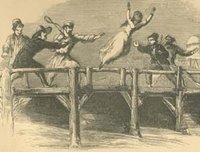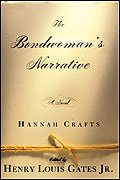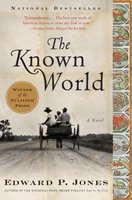Slavery As Literature


 In response to the recent New York Times list of the Best American Fiction in the last twenty-five years, a blogger asked the question: “Is it me, or does a Black writer need to write about slavery to get "on the map?" Apparently, only two African-Americans, Toni Morrison and Edward P. Jones made the lists. And, while I have my own suspicions about why that may be, that is a discussion for another time and another post. Meanwhile, the institution of slavery, and the society which gave birth to such horrendous events, has been the source of many tales both historical and fictional, with a blended cornicopia of storylines and factual details that make for romantic and not so romantic ideas, not only about our history as Africans in America, but also about this country’s rough and rugged beginnings.
In response to the recent New York Times list of the Best American Fiction in the last twenty-five years, a blogger asked the question: “Is it me, or does a Black writer need to write about slavery to get "on the map?" Apparently, only two African-Americans, Toni Morrison and Edward P. Jones made the lists. And, while I have my own suspicions about why that may be, that is a discussion for another time and another post. Meanwhile, the institution of slavery, and the society which gave birth to such horrendous events, has been the source of many tales both historical and fictional, with a blended cornicopia of storylines and factual details that make for romantic and not so romantic ideas, not only about our history as Africans in America, but also about this country’s rough and rugged beginnings.My fascination with American history was only recently ignited in a required history class concerning the United States before 1877. No, actually it began with a World history class where the discoveries of ancient literatures of the world are interwoven with the records of the culture and politics of the societies in antiquity. While records gives us (what we believe are) the facts, literature fills in the gaps and aids in aleviating the mysteries of who we are, how we got here, and where are we going. It would seem to me that history and literature go hand in hand.
A required book review, which I chose to do about the book American Slavery, American Freedom, brought into focus the reality of how closely intertwined and how relevant our presence was in this country at such a crucial point in time. Slave narratives such as The Bondswoman’s Narrative, Clotel or The President’s Daughter, The Autobiography of Fredrick Douglas, even Uncle Tom’s Cabin and the stories collected from former slaves in interviews sponsored by the Federal Writers’ Project during the 1930s, paint real or imagined ideas of what it was to be African in a country searching for it’s own identity outside of Europe. They help us to understand and believe that our lives and our stories are compelling and universal in terms of struggle, sacrafice, passion, hope and liberty.
The Known World, by Edward P. Jones, tells the story of slaves owned by a black man who had also been a slave. That’s a brain journey if ever there was one, not to mention the hundreds of blacks who lived free, in the south, during slavery. The history of Fort Mose at St. Augustine in Florida is a starting point for yet another story, or the last clipper ship that brought as many as 160 African slaves illegally to Mobile, Alabama from the Gulf of Guinea in western Africa. And, whose descendents still survive in Africatown, U.S.A.
Of course, our contemporary stories are important too. But, our history as Americans has been a unique, to say the least, journey and experience unlike any other Africans in history. And, it is worth telling over and over again until we can all heal, celebrate and walk upon this land with authority.
Labels: literature, Reading









0 Comments:
Post a Comment
Subscribe to Post Comments [Atom]
<< Home